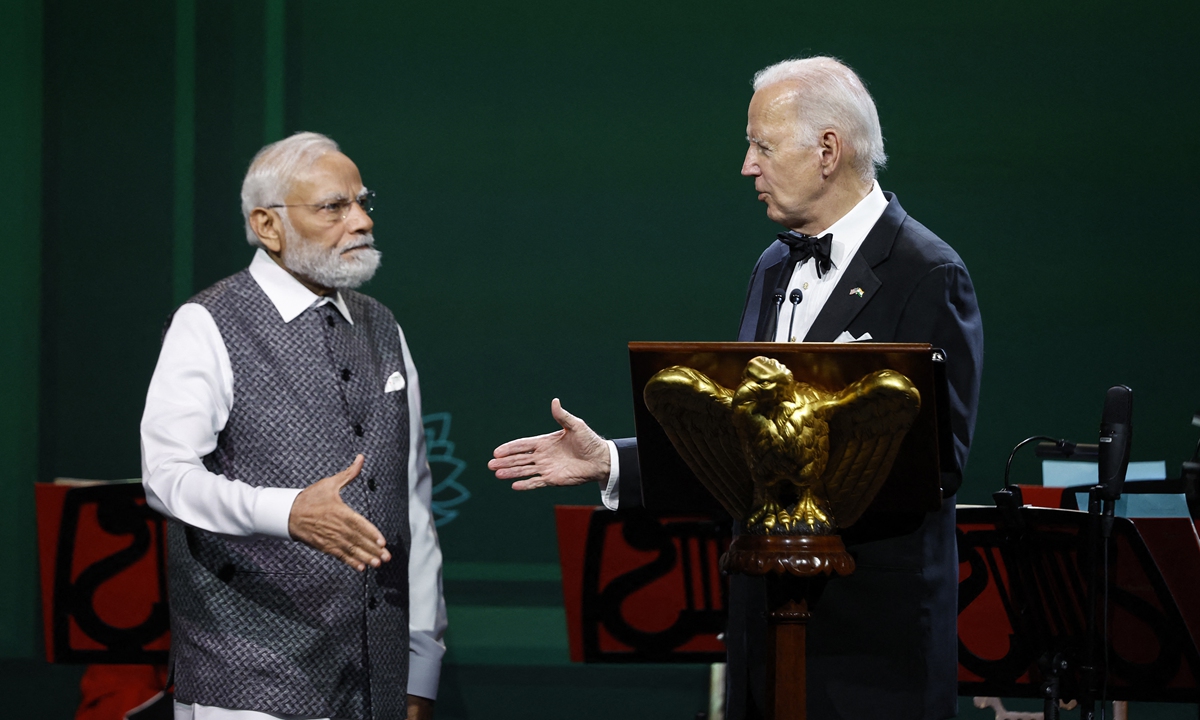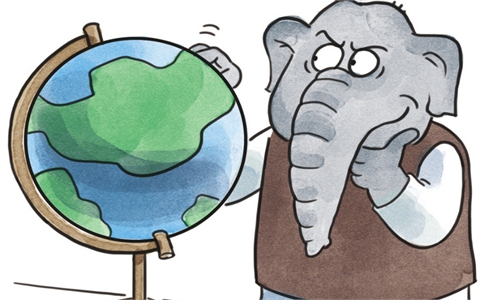US will lose its 'huge bets' on China’s neighboring region: Global Times editorial

US President Joe Biden (R) and Indian Prime Minister Narendra Modi (L) shake hands during a state dinner at the White House on June 22, 2023 in Washington, DC.Photo:AFP
Indian Prime Minister Narendra Modi has just finished his state visit to the US, but the attention and interpretation of the trip, as well as its possible impact on the regional situation, has only started. US and Indian officials have elevated the visit to a high level, creating an atmosphere of a significant escalation in US-India relations. US officials said, "sky is the limit in India-US relations," while Modi said, "even the sky is not the limit" for partnership between India and the US. The joint statement issued by the two sides, which covers a wide range of fields, leaves such an impression in particular. But disagreements between the two sides have not disappeared or been resolved, but were deliberately covered, which was more hypocritical than if they were honestly listed; and the omnipresent, though unspoken, China-specific elements give a vague sense of unease.The US and India signed a series of agreements in areas of defense, semiconductors, key minerals, high technology and space cooperation. India will receive some key technologies that the US rarely shares with non-allies, and the US technology companies will invest in India. Some US media outlets have said that the US has placed a "huge bet" on India, an interesting term that we can read their subtext: One is that the purpose of strengthening US-India cooperation is not pure and asymmetric, and the other is that there is no confidence in their heart about whether the benefits can be obtained. Compared to the enthusiasm and optimism shown by Washington, the skepticism and attitudes of the US public opinion better reflect the reality that the US-India relationship is not so shiny.
Almost all observers have noted that during Modi's trip, US and Indian officials have avoided mentioning China directly, but the issue of China is widely seen as one of the main drivers of deepening US-India relations. And China has been described in the US media as "the ghost at the US-India feast" or "the elephant in the room." In other words, it is well known that the US is now making overtures to India out of a geopolitical need to bring India in to deal with China, and both the US and India are tacitly aware of this. But this utilitarian nature of the "close ties" is temporary, unstable, and unreliable.
"Shaping the strategic environment in which China operates" has become a US strategy for China, which the US is vigorously promoting. Theoretically, whether India will join in or not is crucial to whether the US can realize this plot. If India joins, the US will have geographically completed its encirclement of China, which is a KPI temptation that Washington politicians can hardly resist, so they will spare no effort to praise and court India, and even give away some benefits in exchange for New Delhi's cooperation or support.
This seems perfect, but we all know that many plans concocted in imagination often fall apart in reality, just like the Chinese idiom "discussing warefare on paper." The more strategically independent a country is, such as India, the less likely it is to strictly follow the script written by Washington, especially when Washington demands actions that go against its own national interests. We believe that New Delhi will make calm and sober choices, as history has proven.
New Delhi certainly has its own undisclosed plans, such as maximizing its interests in the strategic game between China and the US. However, becoming a pawn in US' containment of China does not align with India's interests and principles, nor does it preserve its dignity as a major power. Some Americans complain that India is a "swing state," expressing disappointment with India's refusal to act solely in accordance with the US' wishes. In a broader sense, the number of followers that the US can absolutely control is quite limited, and its attempt to build an encirclement against China is bound to fail.
Global governance requires cooperation among major powers. We welcome US-India cooperation aimed at peace and development. However, we strongly oppose any US-India schemes targeting China, although we are not concerned because we know such schemes will not go far. India has always aspired to be a global power and is now striving to become the "leader of the Global South." China and India are neighboring countries, and the world's two largest developing countries. The US is far away and China is close. To "become the third-largest economy," India must have diplomatic considerations as a major power, and we believe India understands this point.

